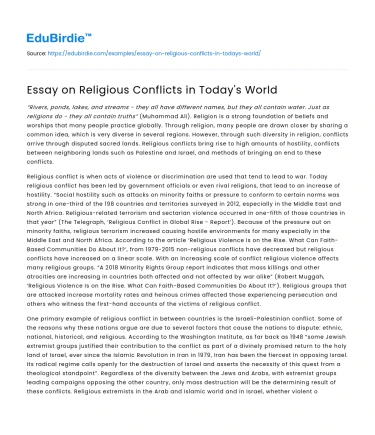“Rivers, ponds, lakes, and streams - they all have different names, but they all contain water. Just as religions do - they all contain truths” (Muhammad Ali). Religion is a strong foundation of beliefs and worships that many people practice globally. Through religion, many people are drawn closer by sharing a common idea, which is very diverse in several regions. However, through such diversity in religion, conflicts arrive through disputed sacred lands. Religious conflicts bring rise to high amounts of hostility, conflicts between neighboring lands such as Palestine and Israel, and methods of bringing an end to these conflicts.
Religious conflict is when acts of violence or discrimination are used that tend to lead to war. Today religious conflict has been led by government officials or even rival religions, that lead to an increase of hostility. “Social hostility such as attacks on minority faiths or pressure to conform to certain norms was strong in one-third of the 198 countries and territories surveyed in 2012, especially in the Middle East and North Africa. Religious-related terrorism and sectarian violence occurred in one-fifth of those countries in that year” (The Telegraph, ‘Religious Conflict in Global Rise - Report’). Because of the pressure out on minority faiths, religious terrorism increased causing hostile environments for many especially in the Middle East and North Africa. According to the article ‘Religious Violence Is on the Rise. What Can Faith-Based Communities Do About It?’, from 1979-2015 non-religious conflicts have decreased but religious conflicts have increased on a linear scale. With an increasing scale of conflict religious violence affects many religious groups. “A 2018 Minority Rights Group report indicates that mass killings and other atrocities are increasing in countries both affected and not affected by war alike” (Robert Muggah, ‘Religious Violence Is on the Rise. What Can Faith-Based Communities Do About It?’). Religious groups that are attacked increase mortality rates and heinous crimes affected those experiencing persecution and others who witness the first-hand accounts of the victims of religious conflict.
Save your time!
We can take care of your essay
- Proper editing and formatting
- Free revision, title page, and bibliography
- Flexible prices and money-back guarantee
One primary example of religious conflict in between countries is the Israeli-Palestinian conflict. Some of the reasons why these nations argue are due to several factors that cause the nations to dispute: ethnic, national, historical, and religious. According to the Washington Institute, as far back as 1948 “some Jewish extremist groups justified their contribution to the conflict as part of a divinely promised return to the holy land of Israel, ever since the Islamic Revolution in Iran in 1979, Iran has been the fiercest in opposing Israel. Its radical regime calls openly for the destruction of Israel and asserts the necessity of this quest from a theological standpoint”. Regardless of the diversity between the Jews and Arabs, with extremist groups leading campaigns opposing the other country, only mass destruction will be the determining result of these conflicts. Religious extremists in the Arab and Islamic world and in Israel, whether violent or not, have used deliberately the ideological and functional linkages to connect to wider bases in their respective countries.
In order to progress forward as a society, resolutions have to be made in order to put an end to these conflicts. Three things you should take into consideration to make a difference: 1) we have a need for a basic understanding of life, 2) we have a need for a sense of meaning and purpose, and 3) we have a need to feel connected to something greater than ourselves. As universal themes globally only applying them will create unity, with peace treaties many countries and groups could bring an end to this global conflict. Only the public can form alliances to put an end to the pain and suffering many are going through, by empathizing we would make amends and end the modern-day religious conflict. Unless we practice what we preach, no true peace could occur.
In conclusion, conflict not only creates chaos, but increases hostility globally with an increase in crime/terrorist rates. Religious conflicts allow several religions and people of a different faith to be persecuted. Even though many religions teach about tolerance and love, without the practical applications of loving others as you love yourself, conflict won’t be resolved.
Citations
- Corissajoy. “Religion and Conflict”. Beyond Intractability, 29 June 2016, http://beyondintractability.org/essay/religion_and_conflict%20
- Moder. “Can We Resolve Religious Conflicts?”, http://immichaels.info/articles/unifying-science-and-religion/14-articles/105-can-we-resolve-religious-conflicts
- Mostafa, Mohamed Galal. “Religion and the Israel-Palestinian Conflict: Cause, Consequence, and Cure”. The Washington Institute for Near East Policy, http://washingtoninstitute.org/fikraforum/view/religion-and-the-israel-palestinian-conflict-cause-consequence-and-cure
- Muggah, Robert, et al. “Religious Violence Is on the Rise. What Can Faith-Based Communities Do about It?”. World Economic Forum, http://weforum.org/agenda/2019/02/how-should-faith-communities-halt-the-rise-in-religious-violence/
- “Religious Hostilities Reach Six-Year High”. Pew Research Center's Religion & Public Life Project, 26 Feb. 2015, http://pewforum.org/2014/01/14/religious-hostilities-reach-six-year-high/
- Reuters. “Religious Conflict in Global Rise - Report”. The Telegraph, Telegraph Media Group, 14 Jan. 2014, http://telegraph.co.uk/news/worldnews/middleeast/10572342/Religious-conflict-in-global-rise-report.html






 Stuck on your essay?
Stuck on your essay?

